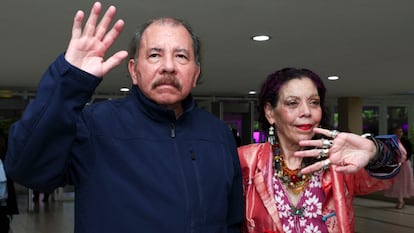Nicaragua regime expels International Committee of the Red Cross
The organization issued a statement detailing only that they are closing operations ‘at the request of the authorities.’ The end of their humanitarian work leaves political prisoners completely unprotected


The regime of Daniel Ortega and Rosario Murillo expelled the International Committee of the Red Cross (ICRC) from Nicaragua on Monday. In a statement issued by the organization’s regional office, operations were shut down “at the request of the Nicaraguan authorities, thus ending the humanitarian mission in the country.”
The expulsion of the ICRC has taken place after relatives of seven political prisoners denounced that authorities at La Modelo prison had transferred the inmates to maximum security cells in retaliation for a hunger strike they began to demand better food and respect for their nightly rest hours — guards bang on the gates, preventing people from falling asleep. Inmates also demanded more frequent outings to the courtyard, more humane treatment from their jailers and to be allowed reading material. One of the political prisoners was “savagely beaten,” according to the complaint.
The role of the ICRC has been vital when it comes to political prisoners in Nicaragua. In 2019, when the Ortega-Murillo family approved an amnesty law that was highly questioned by human rights organizations, the ICRC was in charge of mediating with opponents and the government to draft a list of 200 prisoners of conscience who were released. In 2021, following reiterated complaints of torture and cruel and inhuman treatment that political prisoners suffered inside the fearsome El Chipote prison, the ICRC requested permission to visit to check on the opponents who would later, in February 2023, be sent into forced exile to the United States and stripped of their Nicaraguan citizenship. However, the visit was never granted by the Sandinista regime.
“In 2018, the ICRC received authorization from the Nicaraguan authorities to open a mission in the country, focused on exclusively humanitarian objectives. In January 2019, the ICRC established a permanent Mission in Managua, and in March of that same year, the ICRC and the government of Nicaragua formalized an agreement to visit detained people,” the Red Cross statement said, without giving further details about the reasons for its expulsion.
A relationship that hung by a thread
However, the relationship with the Ortega-Murillo regime was already hanging by a thread. In March 2022, the regime expelled Thomas Ess, head of mission of the ICRC. On that occasion, the ICRC office said it was unaware of the ruling party’s reasons for its decision. “It has taken us by surprise,” they said.
The ICRC’s work in Nicaragua has focused in recent years on three major areas: “Supporting the Nicaraguan Red Cross to provide services to restore contact between family members and to strengthen its humanitarian work in favor of the most vulnerable people; to prevent and address humanitarian consequences of the deprivation of liberty; and training activities on international humanitarian law, the legal framework applicable to tasks in which armed and security forces participate, and international human rights law.”
This work had already taken a hit last May, when the government canceled the legal status of the Nicaraguan Red Cross and confiscated its assets, which were then transferred to the Ministry of Health (Minsa) and renamed as “White Cross of Nicaragua.”
Political prisoners, completely unprotected
Although in its Monday statement the ICRC “reiterates its availability to resume its dialogue and humanitarian action in Nicaragua,” human rights defenders expressed concern at losing the only institutional space left in Nicaragua to advocate and care for the 90 political prisoners that the Ortega-Murillo family will be keeping in prison this Christmas. This figure has been increasing every week, in an effect called “revolving door,” under a totalitarian regime that imprisons priests and even educators, such as Freddy Quezada, a former professor at the National University of Nicaragua (UNAN-Managua).
Quezada, a 65-year-old sociologist, was kidnapped by civilians on November 29 after criticizing the presidential couple on social media. He was later transferred to La Modelo prison.
Sign up for our weekly newsletter to get more English-language news coverage from EL PAÍS USA Edition
Tu suscripción se está usando en otro dispositivo
¿Quieres añadir otro usuario a tu suscripción?
Si continúas leyendo en este dispositivo, no se podrá leer en el otro.
FlechaTu suscripción se está usando en otro dispositivo y solo puedes acceder a EL PAÍS desde un dispositivo a la vez.
Si quieres compartir tu cuenta, cambia tu suscripción a la modalidad Premium, así podrás añadir otro usuario. Cada uno accederá con su propia cuenta de email, lo que os permitirá personalizar vuestra experiencia en EL PAÍS.
¿Tienes una suscripción de empresa? Accede aquí para contratar más cuentas.
En el caso de no saber quién está usando tu cuenta, te recomendamos cambiar tu contraseña aquí.
Si decides continuar compartiendo tu cuenta, este mensaje se mostrará en tu dispositivo y en el de la otra persona que está usando tu cuenta de forma indefinida, afectando a tu experiencia de lectura. Puedes consultar aquí los términos y condiciones de la suscripción digital.








































